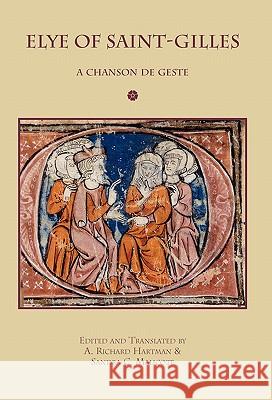Elye of Saint-Gilles: A Chanson de Geste » książka
Elye of Saint-Gilles: A Chanson de Geste
ISBN-13: 9781599101910 / Angielski / Twarda / 2010 / 268 str.
Elye of Saint-Gilles: A Chanson de Geste
ISBN-13: 9781599101910 / Angielski / Twarda / 2010 / 268 str.
(netto: 143,08 VAT: 5%)
Najniższa cena z 30 dni: 140,42
ok. 16-18 dni roboczych.
Darmowa dostawa!
"Elye of Saint-Gilles" tells the story of Elye - the son of Count Julien of Saint-Gilles, a vassal of William of Orange - and of his exploits during his youth and early knighthood. It is part of the William of Orange cycle, whose historical kernel is linked to events of the First and Fourth Crusades and the Reconquest of Spain. As Elye is dubbed a knight, he endures an insult from his father, so he undertakes a self-imposed exile from the court. It is not long, however, before he encounters and battles Saracens. Despite his prowess, they capture and transport him across the sea and attempt to convert him to Islam. After escaping and killing many more Saracens, he himself is mortally wounded but rescued by his own vassal Galopin - the famous character who was the prototype of Shakespeare's Oberon and who makes his literary debut in this work. Galopin delivers Elye to the healing hands of an emir's daughter, Rosamonde, who saves his life. In return, he saves her from an unsuitable marriage with a Saracen elder. For this Elye is again attacked by Saracens, but he is finally rescued by his father Julien, William of Orange, and King Louis. In the end the Saracen lands are converted, Rosamonde and Galopin are married, all make a pilgrimage to Jerusalem, and Elye is married at Paris to Avisse, the sister of King Louis, and he becomes the king's seneschal. Elye of Saint-Gilles is the first English translation of the Old French chanson de geste and includes a new critical edition, facing the English text. This work encapsulates many of the standard elements of the French chanson de geste and provides an excellent example of the virtues of this literary form for entertainment and instruction. The sole manuscript containing "Elye," and its companion piece "Aiol," is found in the 1405 inventory of the library of Margaret of Flanders, duchess of Valois, whose family had been key figures in the First and Fourth Crusades and the Reconquest of Spain. In the late twelfth and thirteenth centuries, the court of Flanders was also a dynamic center of literary activity unrivalled in production by either Champagne or Paris. Dual-language edition. First English translation. Introduction, bibliography, notes, index.











